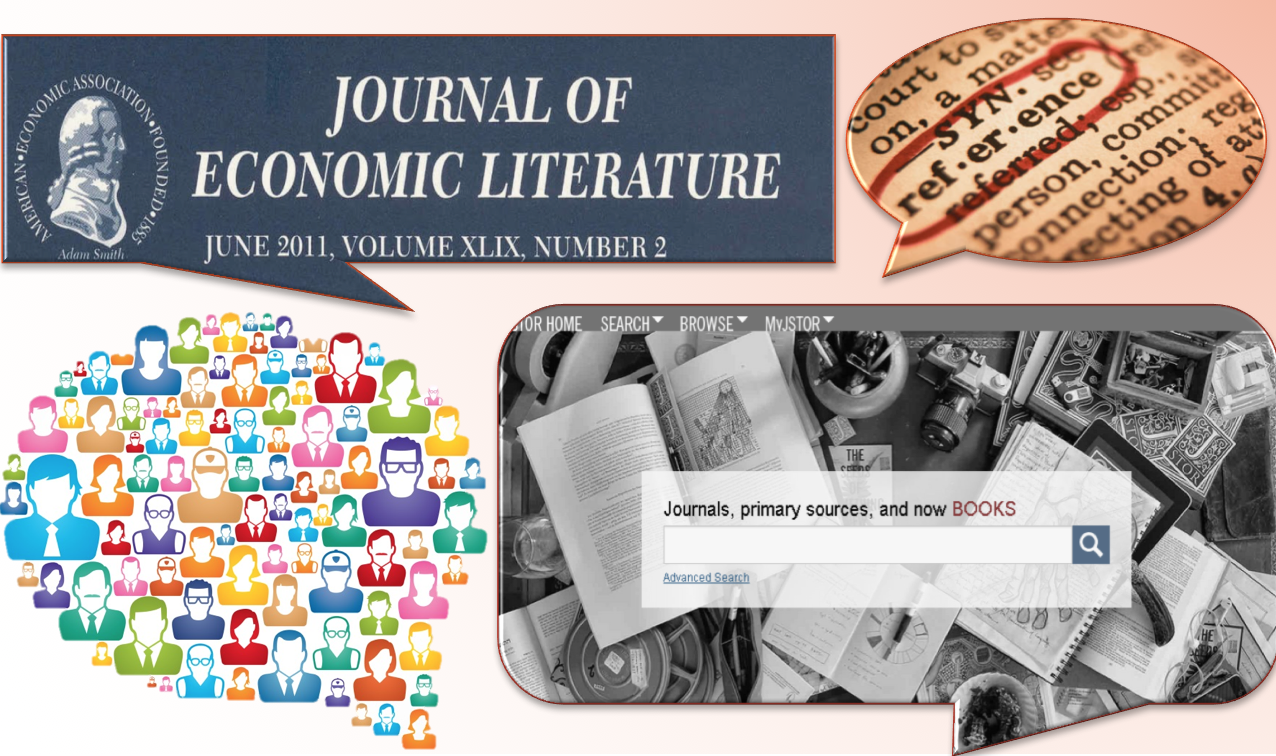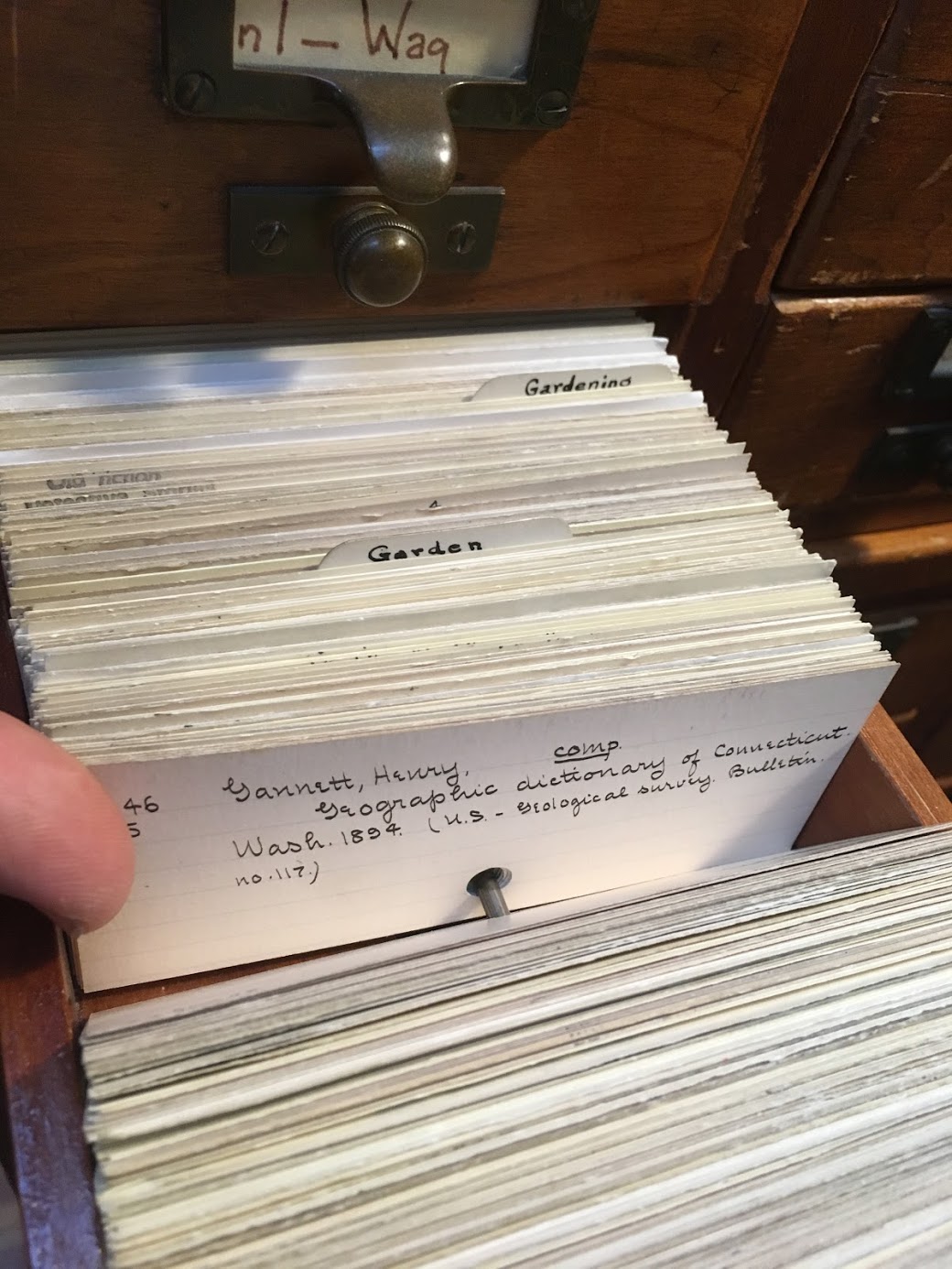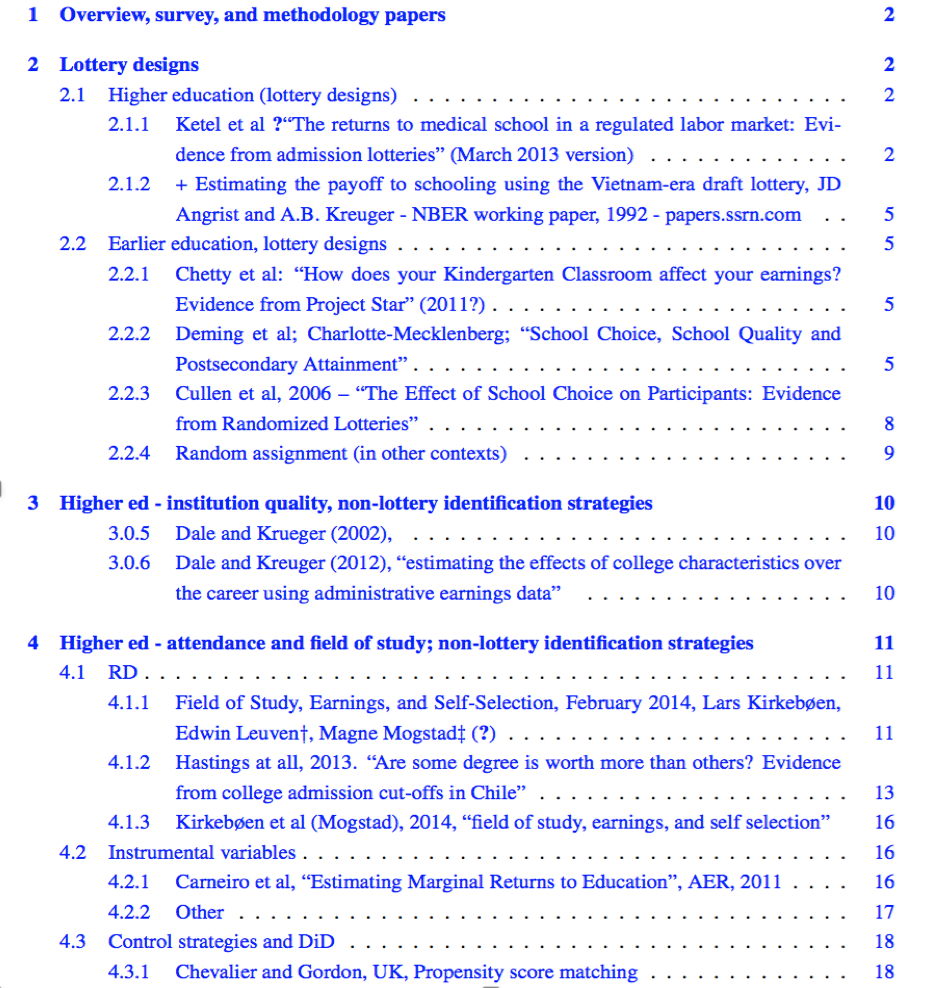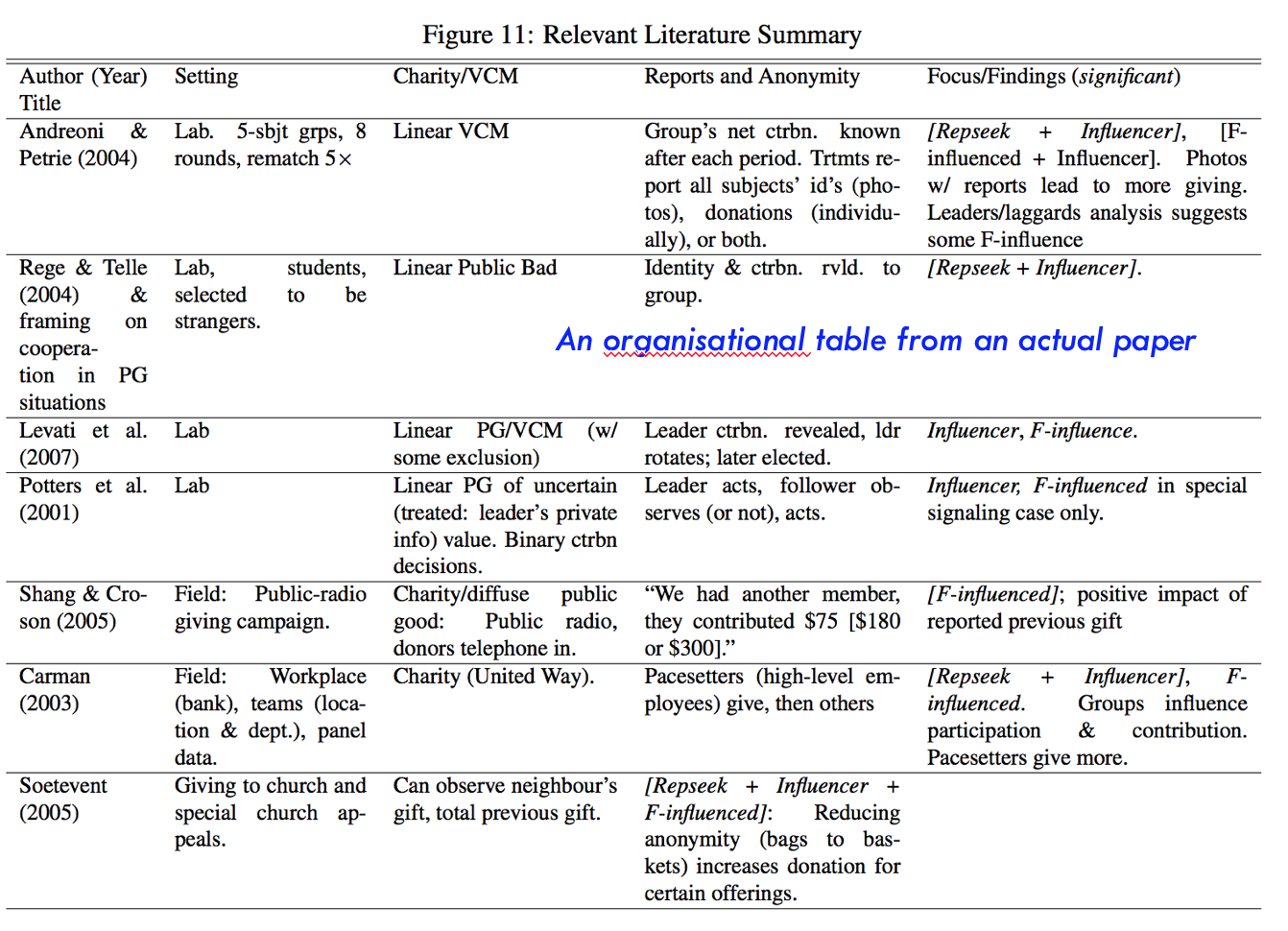When Doing a Lit Review When Do I Cite It
Literature review and citations/references

Figure iv.1: Literature reviews and references
Your may have done a literature survey as part of your proposal. This will be incorporated into your dissertation, not left as separate stand-alone. Most economics papers include a literature review section, which may be a carve up section, or incorporated into the paper'due south introduction. (Come across organising for a standard format.)
Some disambiguation:
A 'Literature survey' paper: Some academic papers are called 'literature surveys'. These try to summarise and discuss the existing work that has been done on a detail topic, and tin be very useful. See, for example, works in The Journal of Economic Perspectives, the Journal of Economic Literature, the "Handbook of [XXX] Economics"
Many student projects and undergraduate dissertations are mainly literature surveys.
What is the indicate of a literature survey?
Your literature review should explain:
-
what has been done already to address your topic and related questions, putting your piece of work in perspective, and
-
what techniques others have used, what are their strengths and weaknesses, and how might they exist relevant tools for your own assay.

Figure four.2: Have notes on this as you read, and write them up.
What previous piece of work is relevant?
Focus on literature that is relevant to your topic simply.
But exercise non focus only on manufactures virtually your exact topic ! For case, if your paper is about the relative price of cars in the Uk, you lot might cite papers (i) about the global machine market place, (2) most the theory and bear witness on competition in markets with similar features and (three) using econometric techniques such equally "hedonic regression" to gauge "price premia" in other markets and in other countries.
Consider: If you were Colchester a doctor and wanted to know whether a medicine would exist effective for your patients, would yous but consider medical studies that ran tests on Colchester residents, or would you lot consider more than general national and international investigations?
What are "good" economics periodical manufactures?
Y'all should aim to read and cite peer-reviewed manufactures in reputable economics journals. (Journals in other fields such equally Finance, Marketing and Political Scientific discipline may also exist useful.) These papers take a certain credibility as they have been checked by several referees and one or more editors earlier being published. (In fact, the publication process in Economics is extremely lengthy and difficult.)
Which journals are "reputable"? Economists spend a lot of time thinking most how to rank and compare journals (there are and then many papers written about this topic that they someone could offset a "Journal of Ranking Economics Journals". For instance, "REPEC" has 1 ranking, and SCIMAGO/SCOPUS has some other i. You may desire to focus on journals ranked in the pinnacle 100 or top 200 of these rankings. If y'all detect information technology very interesting and relevant paper published somewhere that is ranked below this, is okay to cite it, merely you may desire to be a bit more than skeptical of its findings.
Whatsoever journal y'all notice on JSTOR is respectable, and if you wait in the back of your textbooks, there will exist references to manufactures in journals, most of which are decent.
You may besides detect unpublished "working papers"; these may too be useful as references. Still, it is more than difficult to evaluate the credibility of these, as they have not been through a process of peer review. However, if the author has published well and has a good reputation, it might be more probable that these are worth reading and citing.
Unpublished "working papers"
You may also detect unpublished "working papers" or 'mimeos'; these may also be useful equally references. In fact, the publication procedure in Economics is and so slow (six years from kickoff working paper to publication is not uncommon) that non consulting working papers often means not being current.
All the same, it is more difficult to evaluate the credibility of this 'gray literature', as they take non been through a process of peer review. However, if the writer has published well and has a expert reputation, it might exist more likely that these are worth reading and citing. Some working paper serial are vetted, such as NBER; in terms of credibility, these might be seen as something in between a working paper and a publication.
Which of the following are "peer-reviewed manufactures in reputable economics journals"? Which of the following may be appropriate to cite in your literature review and in your final project? 8
-
Klein, G, J. (2011) "Dare Destabilization and Leniency Programs – Empirical Testify." ZEW - Centre for European Economic Inquiry Discussion Paper No. 10-107
-
Spencer, B. and Brander, J.A. (1983) "International R&D Rivalry and Industrial Strategy", Review of Economic Studies Vol. 50, 707-722
-
Troisi, Jordan D., Andrew N. Christopher, and Pam Marek. "Materialism and money spending disposition as predictors of economical and personality variables." N American Journal of Psychology 8.3 (2006): 421.
-
The Economist,. 'Good, Bad And Ugly'. Web. eleven April. 2015. [accessed on…]
-
Mecaj, Arjola, and María Isabel González Bravo. "CSR Deportment and Fiscal Distress: Practise Firms Change Their CSR Behavior When Signals of Fiscal Distress Are Identified?." Modern Economy 2014 (2014).
-
Universities, U. Thousand. "Creating Prosperity: the role of higher education in driving the UK's creative economy." London Universities UK (2010).
How to observe and admission articles
Yous should exist able to discover and access all the relevant articles online. Leafing through bound volumes and photocopying should not be neededs. (Having been a educatee in the belatedly 90'southward and 2000's, I wish I could become those hours back.)

Figure four.3: The erstwhile way!
Good online tools include Jstor (jstor.org) and Google Scholar (scholar.google.co.u.k.). Your university should have access to Jstor, and Google is accessible to all (although the linked manufactures may require special access). You will usually have the 'most access' when logged into your university or library computing system.If you cannot access a paper, yous may want to consult a reference librarian.
It is also ok, if you cannot access the journal article itself, to employ the last working paper version (on Google scholar find this in the tab that says "all 10 versions", where X is some number, and expect for a PDF). However, authors practice non always put upwards the almost polished versions, although they should do to promote open-access. Equally a very last resort, you lot can e-mail the author and ask him or her to transport yous the paper.
When looking for references, try to find ones published in respected refereed economics journals (see above).
Good starting points: Survey article, course notes, and textbooks
A "survey commodity" is a proficient place to start; this is a paper that is largely a categorization and discussion of previous work on a detail topic. Yous tin ofttimes notice such papers in journals such as
- the Periodical of Economic Perspectives,
- the Journal of Economic Surveys,
- and the Periodical of Economical Literature.
These volition be useful as a "catalog" of papers to read and considers citing. They are also typically very readable and offer a decent introduction to the issue or the field.
It is also helpful to consult module (course) notes and syllabi from the relevant field. Do non just limit yourself to the ones at your own university; many of universities brand their class materials publicly accessible online. These will not just typically incorporate reading lists with well-respected and useful references, they may likewise incorporate slides and other fabric that will aid you better understand your topic and the relevant issues.
Nonetheless, be careful not to take material from form notes without properly citing information technology. (Better yet, effort to find the original paper that the course notes are referring to.)
Textbooks serve as some other extremely useful jumping off point. Look through your own textbooks and other textbooks in the right fields. Textbooks draw from, and cite a range of relevant articles and papers. (You may besides desire to go back to textbooks when you are finding the articles you are reading likewise difficult. Textbooks may nowadays a simpler version of the material presented in an article, and explain the concepts meliorate.)
Backwards and forwards with references
When you detect a useful newspaper, look for its "family." You may desire to go dorsum to before, more key references, by looking at the articles that this paper cited. Run into what is listed as "keywords" (these are normally given at the top of the paper), and "JEL codes". Check what papers this paper cites, and check what other papers cited this newspaper. On Google scholar you tin follow this with a link "Cited by…" below the listed commodity. "Related articles" is also a useful link.
Citations
Proceed track of all references and citations
You may find it helpful to use software to assist y'all manage your citations
-
A storage "database" of citations (due east.m., Jabref, Zotero, Endnote, Mendeley); these interface well with Google Scholar and Jstor
-
An automatic "insert commendation" and "insert bibliography" in your word processing software
Apply a tool like Endnote to manage and insert the bibliographies, or use a bibliography manager software such as Zotero or Jabref,
Farther discussion: Commendation management tools
List of works cited
Put your list of references in alphabetical order past author'south last proper name (surname).
Include all articles and works that y'all cite in your paper; do not include any that you don't cite.
Avoiding plagiarism and bookish offenses**
Here is a definition of plagiarism
The main point is that you demand to cite everything that is not your own work. Furthermore, be clear to distinguish what is your own work and your own language and what is from somewhere/someone else.
Why cite? Not just to give credit to others but to make it clear that the remaining uncited content is your own.
Here are some basic rules:
(Rephrased from Academy of Essex material, as seen in Department of Economics, EC100 Economics for Business concern Handbook 2017-xviii, https://www1.essex.ac.uk/economic science/documents/EC100-Booklet_2017.pdf accessed on 20 July 2019, pp. 15-16)
-
Do non submit anything that is not your ain work.
-
Never copy from friends.
-
Do not copy your own work or previously submitted work. (Caveat: If you are submitting a draft or a 'literature review and project plan' at an earlier stage, this can be incorporated into your terminal submission.
-
Don't copy text directly into your work, unless:
- you lot put all passages in quotation marks: beginning with ' and ending with ', or conspicuously start from the main text
- you cite the source of this text.
It is not sufficient only to add a commendation for the source of copied textile post-obit the copied cloth (typically the end of a paragraph). You lot must include the copied material in quotation marks. … Ignorance … is no defence.' (ibid, pp. 15 )
('Ibid' means 'same every bit the previous citation'.)
WARNINGS
Your university may utilise sophisticated plagiarism-detection software. Markers may also report if the paper looks suspect
Before final submission, they may enquire you to get over your draft and sign that y'all empathize the contents and you take demonstrated that the work is your ain.
Not being in impact with your supervisor may put you lot under suspicion.
Your university may give a Viva Voce oral test if your work is under suspicion. Information technology is a cool-sounding word but probably something you desire to avert.
Your university may store your work in its our database, and can pursue disciplinary action, even after you accept graduated.
Penalties may exist severe, including failure with no opportunity to retake the module (course). You may fifty-fifty risk your degree!
Comprehension questions; answers in footnotes
True or false: "If y'all practise not directly quote a paper y'all exercise not need to cite it" 9
You should read and cite a paper (choose all that are right)… ten
- If it motivates 'why your question is interesting' and how it can be modeled economically
- Simply if information technology asks the aforementioned question as your paper
- Only if it is dealing with the aforementioned country/industry/etc as yous are addressing
- If it has whatever connection to your topic, question, or related matters
- If it answers a like question as your newspaper
- If it uses and discusses techniques that inform those you are using
…Stating empirical results
Don't write: "I accept the null hypothesis."
Exercise write: "The results fail to turn down the null hypothesis, in spite of a large sample size and an estimate with pocket-size standard errors" (if this is the case)
Notation: The question of what to infer from acceptance/rejection of null hypotheses is a circuitous hard i in Classical (as opposed to Bayesian) statistics. This difficulty is in part philosophical: classical hypothesis testing is deductive, while inference is necessarily inductive.
What to report
You demand to read this newspaper more clearly; it is non articulate what they conclude nor what their testify is.
Organising your literature review
A mutual marker comment:
These papers seem to exist discussed in random order – you demand some structure organising these papers thematically, by finding, past technique, or chronologically perchance.
How should you organise it? In what gild?
-
Thematically (usually meliorate)
-
By method, by theoretical framework, by results or assumptions, by field
-
Chronologically (perhaps within themes)
Exercise: Compare how the literature review section is organized in papers y'all are reading.

Effigy 4.4: Organising a prepare of references
Q: What sort of construction am I using in the above outline?
It may likewise exist helpful to brand a 'table' of the relevant literature, as in the effigy below. This volition help y'all get a sense of the methods and results, and how the papers chronicle, and how to assess the evidence. You may stop up putting this in the actual newspaper.

Figure 4.5: Organisational tabular array from Reinstein and Riener, 2012b
What if y'all accept problem reading and understanding a newspaper?
-
Consult a survey newspaper, textbook, or lecture notes that discuss this newspaper and this topic
-
Endeavor to find an easier related paper
-
Ask your supervisor for aid; if he or she can
-
Try to understand what y'all can; practice non try to "false it"
Some literature survey practise's and don'ts
Do not cite irrelevant literature.
Do non merely listing all the papers you could find.
-
Discuss them, and their relevance to your newspaper.
-
What are their strengths and weaknesses? What techniques do they use, and what assumptions practise they rely on? How do they chronicle to each other?
Use correct citation formats.
Try to find original sources (don't simply cite a web link).
Don't just cut and paste from other sources. And brand sure to attribute every source and every quote. Be articulate: which role of your paper is your own work and what is cited from others? The penalties for plagiarism tin can be astringent!
- Critically examine the sources, arguments, and methods
Comprehension questions: literature review
How to hash out empirical results: "Causal" estimation, east.g., with Instrumental Variables
Which is the best way to land it? 12
-
"Every bit I prove in table 2, more lawyers lead to slower growth (as demonstrated by the regression assay testify)."
-
"Tabular array 2 provides show that a loftier share of lawyers in a city's population leads to slower growth."
three."Tabular array 2 shows that a high share of lawyers in a city's population is correlated with slower growth."
Which is better? thirteen
- "However, when a set of observable determinants of city growth (such as Census Region growth) are deemed for, the estimate of this effect becomes less precise."
or
- "In the correct regression I control for all determinants of city growth and notice that there is no effect of lawyers on growth"
Stating empirical results: descriptive
Do write:
"Using the US data from 1850-1950, I find that inflation is lower during periods of recession. This is statistically pregnant in a t-test [or whatever exam] at the 99% level, and the difference is economically meaningful. This is consequent with the theory of …, which predicts that lower inflation increases unemployment. However, other explanations are possible, including reverse causality, and unmeasured covarying lags and trends."
"I find a significantly lower level of aggrandizement during periods of recession, and the divergence is economically meaningful. This human relationship is statistically significant and the data is accurately measured. Thus I find that inflation increases unemployment."
Some tips on writing a skilful paper– relevant to literature reviews
- Answer the question
- Provide articulate structure and signposting
- Demonstrate an ability for critical analysis
- Refer to your sources
- Produce a coherent, clear statement
- Take fourth dimension to proofread for way and expresssion
- Source "Consignment Writing Skills EBS 3rd twelvemonth 2012""
Source: https://bookdown.org/daaronr/writing-econ/lit-review-do.html
0 Response to "When Doing a Lit Review When Do I Cite It"
Post a Comment